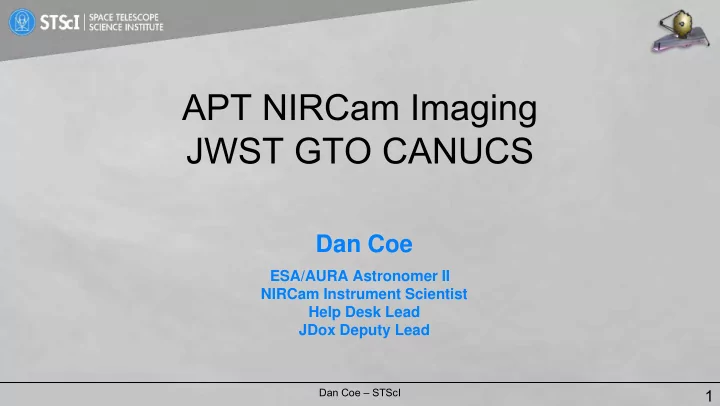

APT NIRCam Imaging JWST GTO CANUCS Dan Coe ESA/AURA Astronomer II NIRCam Instrument Scientist Help Desk Lead JDox Deputy Lead Dan Coe – STScI 1
NIRCam Imaging Observations • Pointing • Exposure Times • Overheads – in detail for every exposure • Dithering – including proposed more efficient patterns Dan Coe – STScI 2
Abell 370 Dan Coe – STScI 3
Default NIRCam observation centers target in gap between modules Dan Coe – STScI 4
Special Requirement Offset (87”, 0”) to center target within module (We will request an “Aperture” feature for offsets as in HST APT.) Dan Coe – STScI 5
Offset 87” to center target within module Dan Coe – STScI 6
Offset 87” to center target within module JDox: “NIRCam Apertures” Dan Coe – STScI 7
Prime: NIRCam Imaging Parallel: NIRISS WFSS Dan Coe – STScI 8
ETC Results Exposure times could be adjusted to match depths Filters paired for simultaneous observations in short and long wavelengths Dan Coe – STScI 9
Filter Pairs ETC Pandeia Python engine Abell 370 2019-08-30 CANUCS APT pairing of filters: F150W – F277W F200W – F356W F115W – F444W F090W – F410M Dan Coe – STScI 10
Dither to fill NIRCam gaps short wavelength (0.6 – 2.3 µm) 0.0317” pixels long wavelength (2.4 – 5.0 µm) 0.0648” pixels Dan Coe – STScI 11
Fill short wavelength gaps only gap between modules no subpixel dithering Dan Coe – STScI 12
Covering module gap is inefficient two 58” dithers (then 117” to return to beginning) I am designing a more efficient pattern… Dan Coe – STScI 13
Slew Time vs. Distance Abell 370 new reduced times improve efficiency especially below 20” Extragalactic Gap between modules Dan Coe – STScI 14
Path 1 Dan Coe – STScI 15
Path 2 1 Dan Coe – STScI 16
Path 3 2 1 Dan Coe – STScI 17
Path 3 2 1 4 Dan Coe – STScI 18
Path 3 2 1 5 4 Dan Coe – STScI 19
see JDox and .pointings file Path 3 6 2 0 1 5 4 CANUCS shorter exposures with NIRISS direct images in parallel Dan Coe – STScI 20
NIRCam Imaging Overheads Initial 16% surcharge Dan Coe – STScI 21
NIRCam Imaging Overheads Initial 16% surcharge File – Export… – times file [.times]… Dan Coe – STScI 22
NIRCam Imaging Overheads Initial 16% surcharge Instrument Overheads primarily File – Export… – times file [.times]… slews, exposures, filter “changes” Dan Coe – STScI 23
CANUCS NIRCam Imaging Overheads in detail Dan Coe – STScI 24
… 11.4 total charged Dan Coe – STScI 25
No graphical timeline yet as for HST… HST APT Dan Coe – STScI 26
Proposed New Dither Patterns 1. INTRAMODULEX Shorter More compact Paths INTRAMODULE 6” per step per axis 1 8 26 73 all dithers < 20” 5 4 reducing overheads Dan Coe – STScI 27
Proposed New Dither Patterns 2. BOX Cover short wavelength gaps with 4 dithers each move 6” or so Dan Coe – STScI 28
Proposed New Dither Patterns 3. SUBPIXEL FSM Subpixel dithering < 0.06” using the Fine Steering Mirror (without slewing) Large enough to mitigate bad pixels in short wavelength channel Dan Coe – STScI 29
Proposed New Dither Patterns 4. BOXWIDE Cover module gap with 4 dithers 6” and 49” moves (49” won’t split visits for Galactic latitude > 45 ° ) Dan Coe – STScI 30
Proposed New Dither Patterns 5? BOXXL 62” dithers to maximize area: 6.1 ´ × 3.2 ´ useful for NIRSpec? variable size dithers? other suggestions? Dan Coe – STScI 31
Dan Coe – STScI 32
Exposure times defined by readout patterns Dan Coe – STScI 33
Detector completes exposure 1 frame later Dan Coe – STScI 34
Consistent Exposure Times in APT 25.1 and ETC Example: 2 integrations, 3 groups, SHALLOW4 2 × (2 × 5 + 4 + 1) = 2 × 15 = 30 frame times = 322.1028 seconds (full detector) single frame time = 10.73676 s (ETC currently assumes 10.74 s → 322.2 total) Dan Coe – STScI 35
9 NIRCam Readout Modes M. Robberto Dan Coe – STScI 36
NIRCam Readout Modes are Familiar Times for full detectors (not subarrays) WFC3/IR first subsequent NIRCam first subsequent Readout group groups Readout group groups Mode (s) (s) Mode (s) (approx.) (s) (approx.) SPARS5 5 2.932 SPARS10 10 RAPID 10.7 2.932 10.7 SPARS25 25 BRIGHT 21.5 2.932 10.7 or 21.4 SPARS50 50 SHALLOW 53.7 2.932 21.5 or 42.9 SPARS100 100 MEDIUM 107.4 2.932 21.5 or 85.9 SPARS200 200 DEEP 214.7 2.932 21.5 or 85.9 Dan Coe – STScI 37
Recommend
More recommend